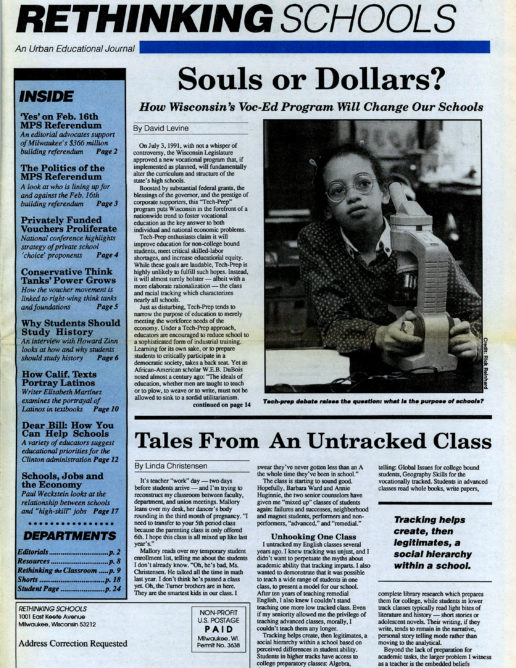Conservative Think Tanks’ Power Grows
The privately funded voucher movement may seem just one more example of corporate philanthropy, similar to the scholarships and tutoring programs that businesses have always sponsored to try to prove their civic-mindedness.
But integrally linked to this movement is a complex web of right-wing think tanks and foundations led by unabashedly conservative ideologues such as Michael Joyce, president of the Lynde and Harry Bradley Foundation in Milwaukee.
The Indianapolis conference (see story, page 4) was sponsored in cooperation with three prominent conservative groups: the Philanthropy Roundtable, the State Policy Network, and the Texas Public Policy Foundation.
It would be impossible to outline all the interrelationships between these and similar groups around the country. But even a brief look reveals a well-funded network of like-minded people who believe that the problems in the United States stem from government programs and can only be solved by an unbridled marketplace. The groups routinely target not only the “monopoly” of public schools, but environmental regulation, the “myth” of growing poverty, national health care proposals, and civil rights legislation. One of their main strategic goals is privatization, not just of education but of basic government services such as roads and airports.
The Philanthropy Roundtable was founded in 1987 as a way for conservative grantmakers to coordinate their efforts.
The chairman of the board is Michael Joyce of the Bradley Foundation. Other directors include representatives from well-known conservative foundations such as the John M. Olin Foundation in New York and the JM Foundation in New York. Members of the Roundtable have been active in funding national, state and local conservative think tanks.
Prior to 1984, conservative foundations concentrated on investing in national think tanks such as the American Enterprise Institute, the CATO Institute, and the Heritage Foundation. The founding of the Chicago-based Heartland Institute in 1984 was the start of efforts to also develop state and local conservative think tanks that focus on a free-market approach to social issues.
The state think tank movement took a step forward this year with the founding of the State Policy Network, which provides coordination and resources for the conservative state think tanks. Its president is Matt Glavin of the Georgia Public Policy Foundation, which started the privately funded voucher initiative in Atlanta, and its executive director is Byron Lamm, who was one of the organizers and moderators at the Indianapolis school “choice” conference. Other board members include representatives from the JM Foundation (also represented on the board of directors of the Philanthropy Roundtable), the Heartland Institute, and the Adolph Coors Foundation.
The Philanthropy Roundtable newsletter carried a front-page story this fall on the State Policy Network. Entitled The State Policy Movement: A New Frontier, it lists 31 conservative state and local think tanks. The September 1992 newsletter of the Heartland Institute has a state-by-state list of 101 organizations that conduct and disseminate “market-oriented research and commentary on state and local public policy issues.” Most of them are less than three years old, and almost all have neutral-sounding names such as the Wisconsin Policy Research Institute, or the Resource Institute of Oklahoma, or the Iowa Public Policy Group.
While both the Philanthropy Roundtable and the State Policy Network often describe their missions in vague-sounding language such as promoting “private initiative,” “individual responsibility,” and fostering a “vibrant private sector,” their politics are often far more raw.
Take Michael Joyce.
Joyce is head of the Bradley Foundation, one of the largest foundations in the country and a key source of funding for conservative thinkers. With an estimated $26 million in annual grants, the Bradley Foundation carries significant clout that it directs toward conservative causes. To cite just three examples of its involvement in the “choice” movement in Milwaukee alone: the foundation was the principal financial
supporter of the Milwaukee private voucher initiative, provided the money this past year for the Virgil C. Blum Center for the Parental Freedom in Education at Marquette University, and helped found the Wisconsin Policy Research Institute, which routinely provides “research” and articles critiquing the public schools and promoting private school “choice.”
In an opinion article in The Milwaukee Journal on June 21, 1992, Joyce explained the private voucher initiative in terms that went far beyond providing money for low-income parents. Launching a broadside against public education, Joyce charged that public school curriculum reflects “everything from environmental extremism, to virulent feminism, to racial separatism, to a radical skepticism about moral and spiritual truths….”
The State Policy Network is also prone to promoting similarly blunt ideological broadsides.
A new phenomenon, the State Policy Network has a limited number of initiatives. Its first project was a book, Gridlock in Government: How to Break the Stagnation in America, that is being distributed through its state affiliates. Following are two representative views from the book:
- A chapter on “Resegregating America” begins: “The Los Angeles riots in 1992 were not just a protest over the failure to convict the police who beat Rodney King; they were a sign of the social sickness and criminals that are endemic in low-income minority communities.”
- The chapter later criticizes “wasteful, silly ideas” such as providing birth control information and devices to teenagers. It complains: “The problem of sickly babies — who are cared for at great expense by the taxpayers — does not come from a lack of free medical care. It comes from a lack of caring by irresponsible mothers.”
If a private voucher movement comes to your city, its likely connections to groups with such views will purposefully be kept obscure. But that doesn’t mean that the connections aren’t there. You’ll just have to do a little investigation

